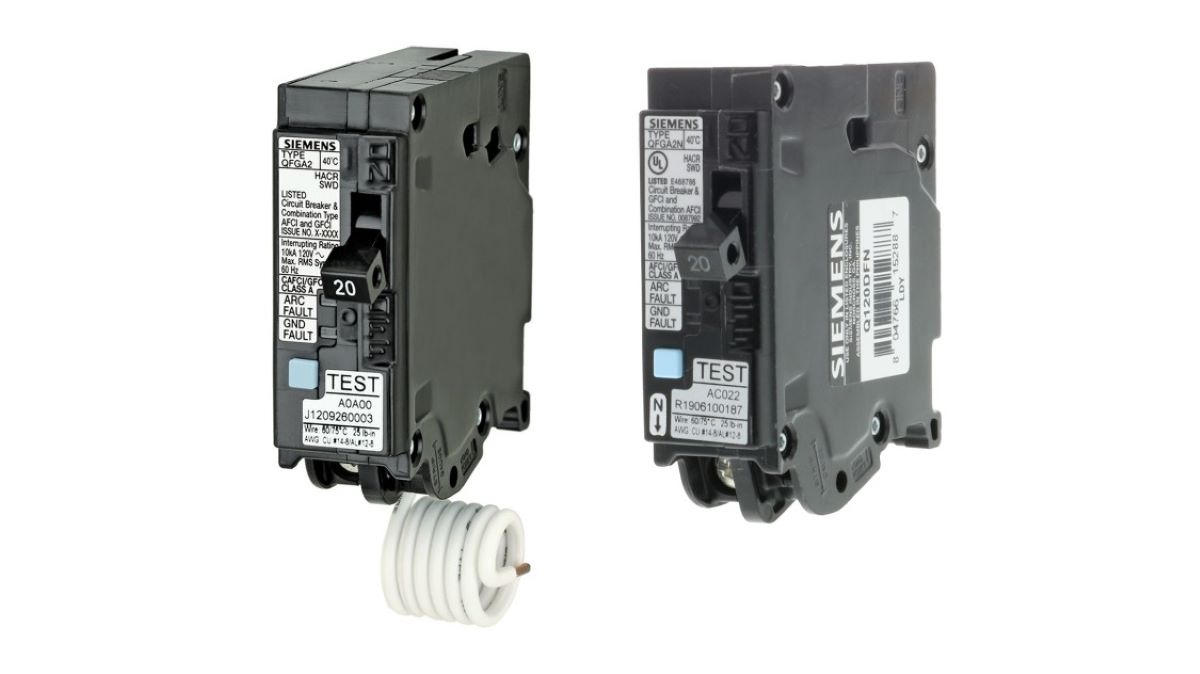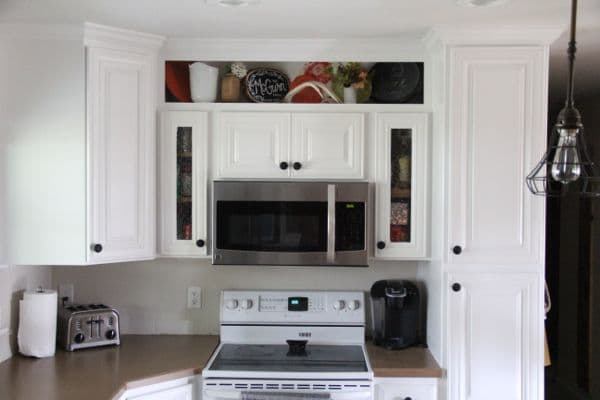AFCI breakers (arc fault circuit interrupters) are an important safety feature that is required in kitchens by the National Electrical Code. AFCI breakers help to protect against electrical fires and are designed to detect arcing faults in the home wiring system. An AFCI breaker will trip and shut off the power when it detects an arcing fault. This is a valuable safety feature that should be included in any kitchen wiring design.
Overview of AFCI Breakers
AFCI stands for Arc Fault Circuit Interrupters. These devices are essential for protecting against dangerous electrical arcs in your home. In the kitchen, particular attention should be paid to installing and maintaining AFCI breakers. This is because the kitchen has several appliances that have the potential to cause a dangerous arc when plugged in, such as toasters and microwaves.
AFCI breakers offer protection against dangerous electrical arcs by quickly cutting off the power supply when an arc is detected. They are designed to detect arcs that normal circuit breakers may not be able to detect. As such, they provide an additional level of safety in the kitchen when compared to traditional circuit breakers.
AFCI breakers are not required in every kitchen. However, they are recommended for any kitchen that has several appliances that could cause an arc. In the event of an arc, an AFCI breaker could help to prevent a fire. It is important to note, however, that an AFCI breaker cannot replace the need for regular maintenance and cleaning of kitchen appliances.
In conclusion, AFCI breakers are an important safety device for kitchens with several appliances that could cause a dangerous arc. While they are not mandatory, they provide an additional level of safety in the kitchen that should not be overlooked. It is important to remember that regular maintenance and cleaning of kitchen appliances is still necessary to ensure safety.
Benefits of AFCI Breakers
Kitchen safety is a top priority for any residential homeowner, and the right electrical wiring is key to ensuring that safety. One of the most important components of any kitchen electrical wiring is the AFCI (Arc Fault Circuit Interrupter) breaker. An AFCI breaker is designed to detect and shut off arc faults, or electric sparks that can lead to a fire. While AFCI breakers are not legally required in all kitchens, they provide an extra layer of safety and protection that should not be overlooked.
AFCI breakers provide numerous benefits in the kitchen, including protection from shocks, overheating, and fires. Because they can detect arcing from a higher distance than a standard breaker can, AFCI breakers are much more effective at shutting off the electricity to prevent an electrical fire from starting. They are also able to detect arcing from a greater variety of sources, including electrical cords and wiring, outlets, and even small appliances. As a bonus, AFCI breakers also help to reduce the risk of electrical shock and overheating, both of which can be dangerous in the kitchen.
Though AFCI breakers are not legally required in all kitchens, they are an important part of any kitchen electrical wiring and should not be overlooked. Not only do they provide an extra layer of safety and protection, but they can also help to reduce the risk of electrical shock and overheating. With the benefits of AFCI breakers, it’s easy to see why they are an important part of any kitchen safety plan.
When Are AFCI Breakers Required?
With the ever-increasing availability of electrical appliances, protecting your home from electrical fires has become a paramount concern. An Arc-Fault Circuit Interrupter (AFCI) breaker is designed to detect and prevent electrical fires and is an essential component of any home’s electrical system. But do you need AFCI breakers in your kitchen?
The answer is yes. The National Electrical Code (NEC) requires AFCI breakers in all kitchens as part of a home’s overall electrical safety system. AFCI breakers are designed to detect and prevent electrical arcs, which are an often overlooked but very real danger in any home. Arcs occur when an electrical current takes a path other than the intended one and can cause electrical fires if left unchecked.
AFCI breakers are designed to detect and prevent these arcs and are required by the NEC for all kitchen circuits. They are available in both 120-volt and 240-volt versions and come in a variety of sizes and amperage ratings to fit any kitchen’s needs. The NEC also requires that all AFCI breakers be tested annually to ensure they are functioning properly.
When it comes to protecting your home from electrical fires, AFCI breakers are an essential part of the equation. While they may seem like an extra expense, their ability to detect and prevent arcs makes them an invaluable part of any home’s electrical safety system.
What Areas of the Kitchen Require AFCI Breakers?
When it comes to electrical safety in the kitchen, AFCI breakers are essential components. An Arc Fault Circuit Interrupter (AFCI) is a device that detects arcing faults in an electrical circuit and interrupts the flow of electricity to prevent fires. While most homes built before 1999 may not have had these devices installed, any home built after this time should have them installed in all areas of the kitchen.
The National Electrical Code (NEC) requires AFCI protection for any circuit that supplies outlets located in all areas of the kitchen, including the sink, countertop, dishwasher, refrigerator, and range. Additionally, AFCI protection is also required for the ceiling fixture and any other appliance that may be installed in the kitchen.
AFCIs are designed to detect arcing faults, which are more dangerous than a simple overload or short circuit. Arcing faults occur when electricity jumps across an air gap and can create sparks that can cause a fire. By installing AFCIs in the kitchen, you can ensure that any arcing fault is quickly detected and prevented from causing a fire.
AFCI breakers are a critical component of electrical safety in the kitchen, as they provide protection from arcing faults and can help prevent fires. By ensuring that all areas of the kitchen are protected with AFCI breakers, homeowners can rest assured that their kitchens are safe and secure.

Regulations for Installing AFCI Breakers in the Kitchen
The kitchen is a special area of the home due to the potential for electrical hazards such as short circuits and fires. This is why it is important to ensure your kitchen is equipped with the proper safety measures, such as installing Arc Fault Circuit Interrupter (AFCI) breakers. AFCI breakers are designed to detect and trip circuits if they detect a potential arc fault or short circuit. By installing AFCI breakers in your kitchen, you are providing an extra layer of protection against electrical hazards and helping to ensure the safety of your family and home.
When installing AFCI breakers in the kitchen, certain regulations must be followed. According to the National Electric Code, AFCI breakers must be installed on every branch circuit that supplies power to the kitchen. This includes circuits that power small appliances, countertop outlets, and lighting. Additionally, AFCI breakers must be installed on any circuits that power outlets in areas adjacent to the kitchen, such as a dining room or pantry. To ensure that your kitchen is properly protected, it is important to follow these regulations and make sure that AFCI breakers are installed in the appropriate places.
Cost Considerations of Installing AFCI Breakers
If you are considering remodeling your kitchen, you may be wondering if you need to install AFCI breakers. Installing AFCI breakers is a safety measure that is required in many homes, but it can come with some additional costs.
AFCI breakers are designed to protect against electrical fires by detecting arcing faults and cutting power before the arcing fault can cause a fire. This is particularly important in areas such as kitchens and bathrooms, where the presence of water increases the risk of an electrical fire.
Before deciding whether to install AFCI breakers in your kitchen, you should consider the cost involved. The cost of AFCI breakers will depend on the size of the breaker, the type of breaker, and the cost of installation. In general, AFCI breakers are more expensive than standard circuit breakers. Additionally, the cost of installation can vary depending on the complexity of the job.
Overall, installing AFCI breakers in your kitchen is a wise investment that will help protect your home from electrical fires. Although the cost of the breakers and installation can be expensive, the peace of mind from knowing that your family is safe is well worth the investment.
Troubleshooting AFCI Breakers
When dealing with electrical issues in a kitchen, it is important to know if AFCI breakers are required. AFCI (arc-fault circuit interrupter) breakers are designed to detect arcing, a dangerous condition that can cause fires. In most cases, kitchens must be equipped with AFCI breakers.
If you are experiencing electrical problems in the kitchen, it is essential to troubleshoot the issue with an AFCI breaker. A qualified electrician can help you determine if the breaker is functioning correctly. If the breaker is tripping, the electrician can troubleshoot the wiring to identify any issues. If the breaker is not tripping, you may need to replace the breaker if the wiring is not the issue.
It is also important to know if any new electrical work must be done with AFCI breakers. According to the National Electrical Code (NEC), AFCI protection is required in most kitchens, and any new circuits added must be protected with AFCI breakers. If you are having any new wiring done, make sure your electrician follows the NEC code requirements.
Troubleshooting AFCI breakers is an important part of ensuring the safety of your kitchen. Working with a qualified electrician is the best way to ensure that all electrical work is done correctly and safely. By following the NEC code requirements, you can be sure that your kitchen is properly protected from the dangers of arcing and other electrical issues.
FAQs About the Are Afci Breakers Required In Kitchen
1. What does an AFCI breaker do?
AFCI breakers provide protection against electrical fires caused by arcing faults in the wiring. They detect arcing faults and shut off the circuit before a fire can start.
2. Is an AFCI breaker required in a kitchen?
Yes, an AFCI breaker is required for any circuit supplying power to a kitchen. This is to help protect against fire hazards due to arcing faults in the wiring.
3. Where can I find an AFCI breaker for my kitchen?
AFCI breakers can be purchased from any home improvement store or electrical supply store. You can also purchase them online from websites such as Amazon.
Conclusion
AFCI breakers are required in kitchens to help protect against electrical fires. They are an important safety feature that should not be overlooked. An AFCI breaker is designed to detect and trip if it senses a potential arc fault, which could lead to an electrical fire. Although they are not required in all kitchens, it is highly recommended that they be installed to provide the highest level of safety.


